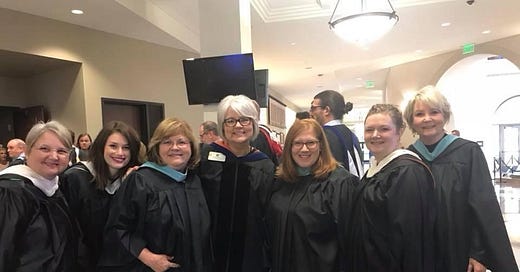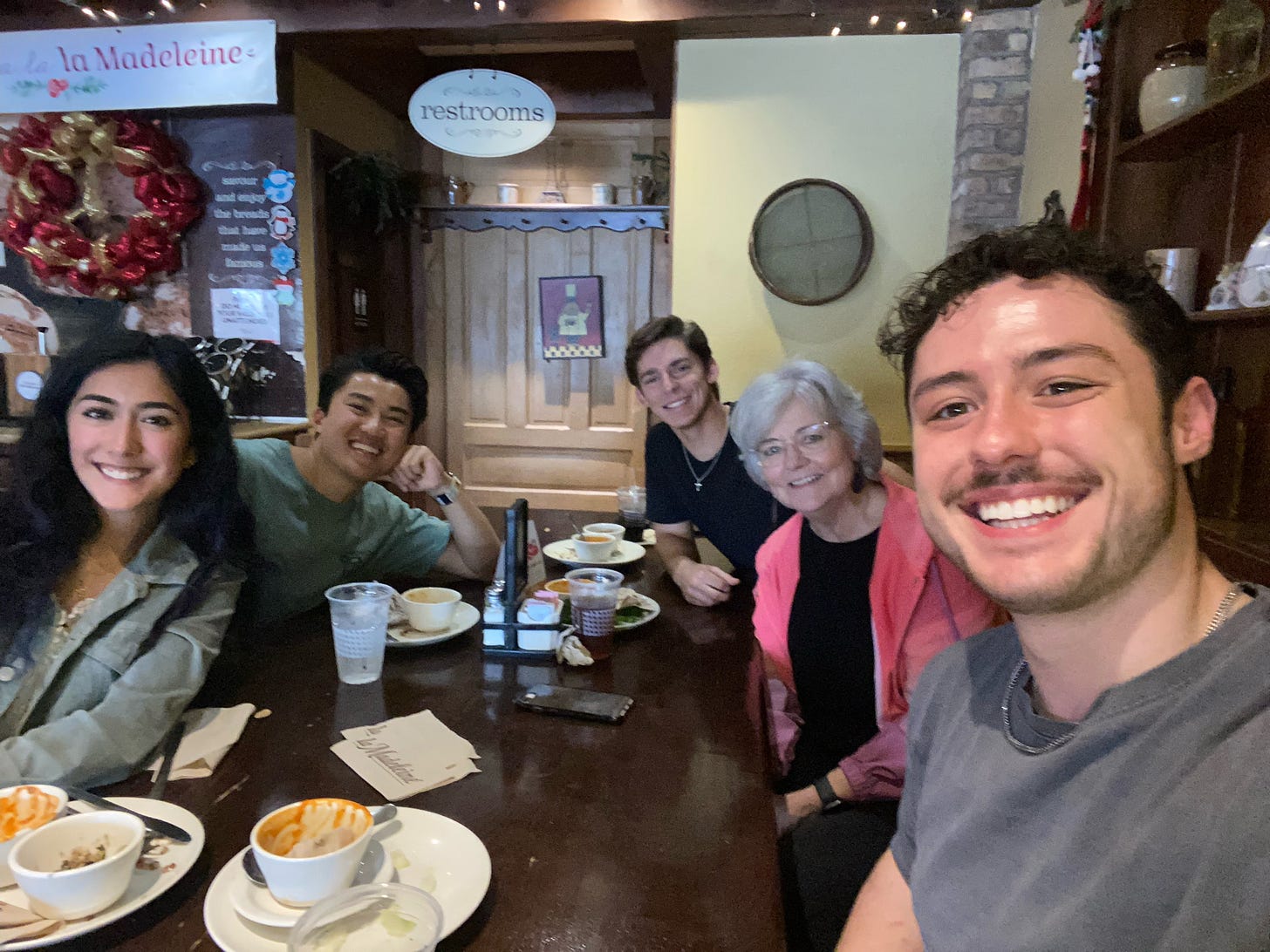Letter 36: Filled with Joie de Vivre
When we enjoy friendships in our 70s ~ Friendship Series, Part 6
Welcome to the final installment of our Friendship Series—today we focus on friendships in one’s 70s.
Today’s letter is penned by one of my favorite people in the world—a mentor and dear friend. I know Maryann because she was my department chair for many years when I taught high school English; however, our bond and friendship have extended beyond the classroom. Maryann is incredibly generous, kind, and sociable, which made her the perfect voice for the final letter in our Friendship Series. I had the pleasure of studying under her for my entire career in teaching and even shared a classroom with her for several of those years. I learned so much from her, of course in the classroom, but even more in how she treats and shows others love.
As our series has covered every decade in one’s life—from our 20s to our 70s, I’ve noticed a thread that has run through each letter: each author has in some way come to the conclusion that the most meaningful friendships we’ve had include an element of selfless love.
What a pleasure it has been to share these women’s stories with you! —Emily
(You will find all five of our past letters in the series included at the end of this letter.)
“Friendship is the golden thread that ties the heart of all the world.”
John Evelyn
All of my life, at least as far back as I can remember, I’ve had friends of all ages. As a child, my friends were my grandparents. I know that one doesn’t usually think of grandparents when one thinks of one’s friends, but my grandparents loved me completely. Not only were they smitten with each other, I believed that they loved me with a pure, profound love, that they were enamored with me and I could do no wrong. They included me in the “daily-ness” of their lives, and I think that is one of the surest signs of true fellowship—friends not only in the glitzy moments and on the mountain peaks or in the deep valleys, but also the day-to-day moments. I loved them like no other.
As a teenager, my best friend was a girl, my age, who I met at camp. We went to summer camp together for four years, and that was pretty much the length of our friendship. However, they were difficult years for me, and she was a willing listener. In college my best friend was also my age; she was married, and she and her husband gave me the respite I needed to escape dorm life by providing a sofa for me to sleep on when the craziness of campus life was too much for me. But many of my close friends as an adult have been older or younger than I. I realized early on in my adult life that I needed the wisdom that the older women had; I also needed to share anything I learned with my young friends. This often happened at school and at church. And I have been blessed immeasurably by the relationships. My daughters, my younger colleagues, and even my students have helped me stay young in my thinking. My older friends (and I still have some who are older!) keep me grounded, remind me that this life is temporal and should be lived with a joie de vivre centered on serving others in whatever capacity I can.
One of my favorite quotes is by Joseph Addison (who founded The Spectator and The Tatler periodicals in the 17th century). I’ll change the wording to fit my circumstance:
“[S]he who would pass [her] declining years with honor and comfort, should, when young, consider that [she] may one day become old, and remember when [she] is old, that [she] has once been young.”
It has helped me for many years, not only in the classroom but also in my personal life. I have greatly benefited from my friends, and, honestly, I am little aware of their actual ages.
The fact that I don’t recall ever having a “dry spell of friendship” probably says more about me than about my circumstances. We relocated to a major city for my husband’s training—a place where we knew no one—and we had made friends who became some of our very closest. I think that it reflects in me a need for fellowship of some kind, and that’s probably due to the fact that as I was growing up, I had very few friends because we moved every year or two. And honestly, I was ashamed of my home situation and didn’t really want to let another person into my life. Growing up, I came to realize my need for friends.
Describing a best friend is a difficult question for me because I actually have more than one, so I guess the adjective “best” isn’t the best one for me. Of course, when one is 70 years old, one has more opportunity to gather them. And along the way, one loses them either to distance (but at this point, I wonder if they were truly “best” friends) or to death (and that has happened to me three times due to some type of cancer each had). My best friends have all been people with whom I am totally transparent; there is absolutely no need to fear that I will say something that they will take the wrong way. In other words, they are ready and willing to think the best of me (even when I don’t deserve it), and I, them. They are women with whom I love to travel, either across the world, around the block, or down the school hallway. And when we get together, well, we just “pick up” where we ended the previous time. This is probably a good time to interject that my best friends differ in nature somewhat. What I mean is that I have a best friend at work and a few at church; consequently, what we share differs accordingly.

When we relocated for my husband’s training and met a couple who became best friends (and still are), we realized that we were in the same boat—we had both migrated to a very large city where we knew no one and had, as chance or design would have it, ended up attending the same church. We even lived in the same apartment complex. And that’s saying a lot when the city is Houston! What followed were lots of “What! You, too?” moments. Those moments have continued as we now live in the same area, delight in talking about our grandchildren, and realize that our paths though somewhat different, continue on the same trajectory. I guess that we’re fellows on the same ship. 😊
I find it much easier to develop friendships as I age. It is often a matter of choice, and my “criteria” for friendship have greatly decreased. I think that as I’ve aged, I’ve discovered more of what really matters, and what really matters involves helping others without judgment.
Consequently, along the way, I’ve made friends that I might not have befriended in my early adult life. I have come to appreciate the quirks in others, knowing that I, too, have them. More importantly, I’ve realized that we’re all flawed and in need of grace and mercy from one another.
I want to be a conduit of grace and mercy for others because the Lord knows, I need it!
My sister, almost six years younger than I, died when I turned 50. She had made choices that shortened her life, and for that I was sorry. However, we had never been close. I didn’t live in a family that knew how to model close relationships. Consequently, I think that I have, in a way, searched for “sister-type friends”—females with whom I could share my thoughts and not fear disappointment, ridicule, or disdain from them in return. I know that not all sisters are close friends, but the ideal sisters probably are, at least in my mind.
There are just things that are easier to talk about with other women. For example, I was diagnosed with uterine cancer on my 70th birthday last year. I am thankful for excellent medical care, a compassionate surgeon (who is female, by the way), and a strong support system of family and friends. Having said all of this, I do not particularly want to discuss the medical diagnosis, procedure, or follow-up radiation with any males other than my husband. I wonder about a culture that feels free to discuss anything openly, whether strangers or friends.
Not only is it easier, at least for me, to talk with other women, I often do not have to articulate what I’m feeling when I’m with my friends. They know. There’s a sense of understanding between us, grounded in compassion and camaraderie—that creates a bond that is unlike any other perhaps. When my mother passed, I grieved but not because of what she and I had shared, but rather what we did not share. We did not have the “normal” mother/daughter relationship (is there one?), and prior to going into the memorial service for her, a friend came and sat in the car with me. She said very little, but she understood because of her own experiences. I know that this is possible with males; however, my experiences with understanding and compassionate females far outweigh any with males.
As I’ve alluded to already, I need a kindred spirit of sorts for a friend, someone with whom I share some common ground. In teaching, it’s been those individuals who love great literature and are always looking for more and better ways to share that love with students. At church, it’s those people who share many of my core beliefs but not necessarily all of them. Nevertheless, we can discuss them around the table and remain strong in our beliefs while remaining open to others’. I am comfortable sharing these needs with friends, but I have found that it’s not usually necessary to articulate them. We reflect what we believe by our actions, and so in my experience, people with similar beliefs gather almost spontaneously. And if I have perhaps misjudged a possible friendship, it “dissolves organically.”
“There is nothing better than a friend, unless it is a friend with chocolate.”
Linda Grayson
With gratitude,
Maryann Felps
P.S. Maryann writes that her “older friends…keep me grounded, remind me that this life is temporal and should be lived with a joie de vivre centered on serving others in whatever capacity I can.”
Tell us about a friend who lives with this joie de vivre in the comments and consider sharing this letter with her!
Previous Posts from the Friendship Series








